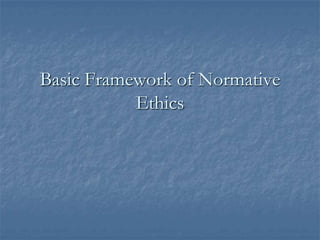
Srength ethics
- 1. Basic Framework of Normative Ethics
- 2. Normative Ethics ‘Normative’ means something that ‘guides’ or ‘controls’ Aims to discover what should be the moral standards that are supported by the best reasons
- 3. Normative Ethics in Management Deontological Theory Teleological Theory Ethical Egoism Utilitarian Principle Kantianism Universalism Distributive Justice Altruism
- 4. Teleological theory Derived from Greek word ‘telos’ means end Determine ethics of an act by looking to the consequences of the decision (The Ends) Utilitarianism and Distributive Justice are based on teleological approach
- 5. Ethical Egoism An action is good if it produces result to maximize person’s self-interest at the expense of others. It denies that a person should help others when the person will get nothing out of it. Enlightened egoism is enlightened self interest – considers the long range perspective of other or humanity on the whole.
- 7. Strengths & Weaknesses of Teleological theory They provide a relatively precise and objective method for moral decision making They are in accord with much of our ordinary moral reasoning; An action would provide some benefit or inflict harm. This is morally relevant reason for or against performing it. Some moral reasoning are non-teleological in character
- 8. Deontological Theory Derived from greek word ‘deon’ means duty This approach believes we have a duty not to do bad Bribery is wrong by its very nature regardless of the consequences It is non-consequential theory Determine the ethics of an act by looking at the process of the decision (The means) Kantianism is based on deontological approach
- 9. Deontology vs Utilitarianism Principle inherent in action Outside the action Individuals are valuable in themselves Criticized because it makes sacrifice, some people for sake of others According to deontologists utilitarian go wrong when they fix on happiness as the highest good. They point out that happiness cannot be the highest good for humans Concerned with total amount of happiness Theory asserts that there are some actions that are always wrong, no matter what consequences Right or wrong are dependent on consequences – vary with the circumstances
- 10. Kantianism- Immanuel Kant For Bentham it is Happiness, for Kant it is goodwill An action is morally right only if the person performing it is motivated by a good will and vice-versa. A goodwill means action done for reasons of principle from a sense of duty, nothing else.
- 11. Kantianism vs Utilitarianism Details Kantianism Utilitarianism Explicit and direct appeal to consequences in determining right or wrong Absent yes Motive for action Sole importance Incidental Permit sacrifice of individuals or minorities to collective self interest No Yes Ethics of: Duty Welfare Theory: Non Consequentialism (Deontological) Consequentialism Formulations on: Sense of Duty, Categorical imperative maxim Utility, Maximise happiness, Hedonism Common good must have priority over every thing else Yes No
- 12. Strengths of Deontological Theory This theory makes more sense in cases where consequences seem to be irrelevant It is the way they account for the role of motives in evaluating actions
- 13. Weaknesses of Deontological theory Failure to provide a plausible account of how our moral obligations and resolve problems of moral conflict Rules in Ross’s theory is plausible; No reason is provided in accepting these rule Ross’s rules are open to ethnocentrism There is no order of priority to guide in cases where they conflict
- 14. Virtue Ethics- Aristotle It asks What kind of person should we be? It does three things It defines the concept of virtue It must offer some list of virtues It offers some justification of that list and explain how we define what are virtues and vices
- 15. Virtue Ethics Emphasizes on role of individual traits Virtue is defined as a character trait that manifests itself in habitual action For Greeks virtue means Excellence Virtue Ethics= Excellence of Human Character
- 16. Strengths Help to resolve Ethical Dilemmas It takes into account the importance of relationships.
- 17. Ethical Relativism There is no universal set of principles by which to judge morality Each society has its rules and it is inappropriate to compare ethical rules of one society with that of another Relativists thus rule out possibility of discussion across societies on ethical issues.
- 18. Thank You
